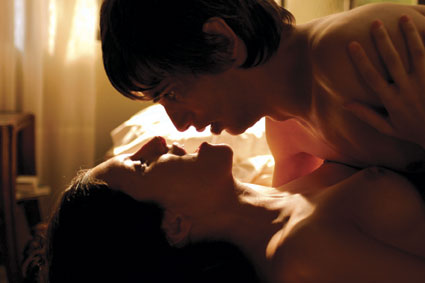
The
CIFF screening of
Happy-Go-Lucky (2008) last night in anticipation of its release later this month (Oct. 24) served a twofold purpose: to present Mike Leigh with a career achievement award and to offer Chicago audiences their first opportunity in a long while to engage the great British filmmaker.
First, on the award. Festival director Michael
Kutza commented that Leigh's first film,
Bleak Moments (1971), won
CIFF's Golden Hugo back in 1972. Gracious, Leigh said the career achievement award was "very special indeed", adding, "It's as if I've come full circle, though I hope it's not the end of the circle!"
Leigh then sat down for a Q&A with
Tribune critic Michael Phillips. The proceedings were lively, to say the least. Audiences were clearly stunned by Leigh's lucid and amicable approach. He was never disengaged for a moment, even (you could say
especially) when faced with a myriad of confused questions.
Happy-Go-Lucky was described by its director as "a story about being connected to your feelings and integrity", an "anti-
miserabilist film". This commentator, for one, was grateful to see Leigh address world issues right off the bat. "There's a great deal for us to be gloomy and pessimistic about," Leigh explained, "I mean, we're suicidally destroying the planet!"
Getting back to the film, he summarized his point: "
Happy-Go-Lucky is about a character getting on with it."
Indeed, Sally Hawkins' Poppy is that rare film heroine, a smart, disciplined woman with a career, dreams, and friends, but who unpretentiously floats from place to place and is content with the terms of each situation she encounters. If there's frivolity or dissatisfaction in her world, it's the others who see it and become the judges of Poppy's behavior. She has an unassertive wisdom and a
heightened sense of awareness that places her on a different plain than virtually everyone she meets.
Poppy is one of the greatest film characters to emerge in the 21st century: a boisterously joyous and inventive elementary school teacher, she
maintains the same free and
unmournful approach throughout the film. "Teaching is an act of optimism," Leigh asserted last night, referring not just to Poppy, but also to the other teachers who dominate the film.
Teaching is the overarching subject of
Happy-Go-Lucky; the characters comment on their own teaching and refer to the lessons of others. It's a critical dialogue that manifests itself with such a quiet ease that by the end of the film you leave the theater wanting to continue the discussion. A public school teacher in the audience was so elated that she personally thanked Leigh.
Happy-Go-Lucky's most crucial interactions occur in the confined space of a Ford Focus. Hawkins' Poppy and Eddie
Marsan's Scott are perfect opposites. He's a peppery driving instructor who won't conform to Poppy's apparent lack of seriousness. A viewer familiar with Abbas
Kiarostami's Ten (2002), in which the Iranian director almost solely used two cameras in a cramped car as his entire visual design, might wonder if Leigh saw it prior to making
Happy-Go-Lucky.
The two cameras, one angled toward the passenger seat, the other to the driver, impose a curious limitation on Leigh's
luxurious palette of London vistas (he opens the film with an amazing shot by a train track worthy of
Antonioni). He alternates the two angles in an almost rhythmic way. As in a John Cage composition, the tension in these rhythms becomes so rigid that it offers an appropriate visual
parallel to Poppy and Scott's intensifying conflicts.
(For a more in-depth summary of the film's many characters and details, check out fellow
CIFF blogger
Marilyn Ferdinand's critique.)
A scene that will surely stand out to viewers has Poppy on a nocturnal tour where she encounters a stuttering man underneath what appears to be a bridge. This writer asked the filmmaker for his thoughts on it, describing it as a moment that felt as if it had snuck away from Leigh's own
Naked (1993). "It's a scene from the film
Happy-Go-Lucky," Leigh retorted, but conceded, "I'm not surprised you would say that." Speaking of his intentions, Leigh said, "We wanted to subliminally pull the audience out of their comfort zone in that scene."
It's a key instant to understanding Poppy, something Leigh confirmed: "It's about her openness, her natural ability to connect. She's going to move on; the man, unfortunately, won't." Leigh even emphasized the film's own afterthought of the scene: "When she goes home, Zoe [her
roommate] asks her where she's been and she doesn't respond. She keeps the moment private."
These dynamic shifts in the film are masterfully integrated, and it only takes a careful viewing to see this. A rambling audience member, stroking his
sideburns and looking distractingly around the room as he told the filmmaker (and us) that he thought the ending didn't exactly summarize the film in a satisfying way had Leigh responding
thusly: "Yeah, you're trying to say it's maybe too neat and tidy. Okay, that's a fair
criticism."
What a gentleman. The rest of the festival will certainly have a hard time living up to this magical evening.






